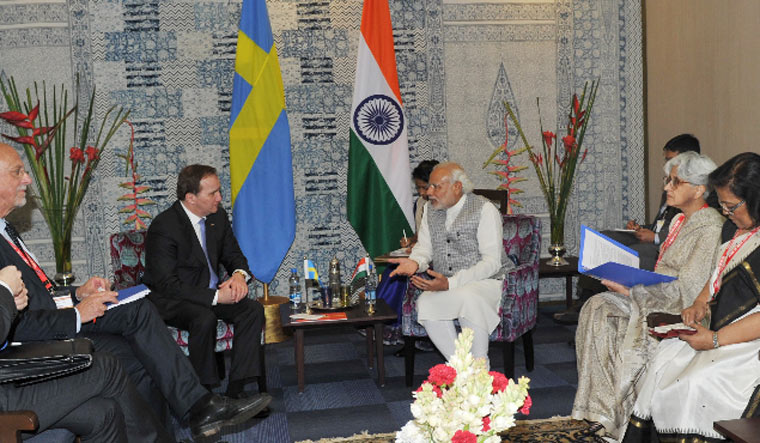The sun is likely to be out in the clear blue Swedish skies this Tuesday, when Prime Minister Narendra Modi holds his official meetings. And the weather reflects the mood, read warm, for Modi. It is after three decades that an Indian prime minister has stopped by in Stockholm. And Modi will be on a mission to woo and is likely to be wooed back.
He will also usher in a new beginning at the first Indo-Nordic Summit later in the day and will be keen to focus on better trade relations. The last time that such a summit was held was with the US under Barack Obama. And India being the only other country with which such a summit is being held, this is an acknowledgement of the growing might of India.
This grouping brings Denmark, Iceland, Norway, Finland and Sweden together—for the first time as a bloc. A different way of looking at these countries even for the MEA, the summit is a positive step. However, the symbolism apart, in terms of economic partnership, Modi will need to achieve a lot.
He has his task cut out. The negotiations between India and the EU on trade have been stalled since 2013. There is no breakthrough in sight. Despite the strong economic message that Prime Minister Modi has been pushing for, trade between EU and India has not picked up much.
Data of the ministry of commerce pegs India's total trade with the E29 as standing at $37,557.03 million in 2016-17 (down from $38,481 million in 2015-16). In the case of individual countries like Sweden and Norway, there has been a steep decline in the same period. The trade with Norway fell by 27.98 per cent, and with Sweden by 13.76 per cent in the last year, according to the FICCI's India and Europe 29: Synergising Economic Vision for Expanded Economic Relations report.
“This government has not signed any major free trade agreement in the last three or four years,'' said professor Gulshan Sachdeva, centre for European studies at Jawaharlal Nehru University. “All the FTAs have been signed under the Manmohan Singh government despite it being weak.”
Prime Minister Modi, credited with re-energising Indian foreign policy, will need then to bring the full power of his charisma to go beyond just the optics especially at the Nordic Summit. There was great hope that Modi—seen as a doer—will bring in an era of change. However, with trade negotiations not moving, there has been a sense of disappointment. This is a challenge that he will need to overcome.
In the first two years of his tenure, the thrust for diplomacy was closer home. There were visits to Europe, but it wasn't perceived as being high on the agenda. Things, however, have changed. In the last year or so, the government, having realised the gap, has chosen to turn its attention to the continent. The Rafale deal with France—again long overdue—has set the right tone.
There will be deliverables—tangible outcomes—in the bilateral meetings with Sweden. On the cards is signing of an agreement to facilitate technology transfer as India looks at fighter jets from Saab. Modi is a post-Bofors prime minister and will be keen to showcase the 'Make in India' programme that Sweden seems to be interested in.
“The interest in India from Swedish companies is growing. They perceive the global weight of India, compared with the last 10 years. The companies realise the need to have a relationship with the Indian market to be a global player,'' said Carsten Gronblad, trade commissioner to India for Business Sweden. He also added that The Swedish Chamber of Commerce India's Business Climate Study 2017/18 suggests that 71 per cent of the Swedish companies (160 SE- respondents, based in India) found the current business climate favourable.
The trip to Sweden will also test Modi's skills as a world statesman. While it isn't officially ever stated, there is a growing discomfort in the last two years in the Nordic countries with there being a crackdown on civil society in India. With the recent rape in Kathua, which has even provoked a response from UN Secretary General António Guterres, there will be a need to project India as more than just a favourable destination for economic investment. Modi will need to make a bid to win the hearts and minds of his hosts, and not only their wallets.


